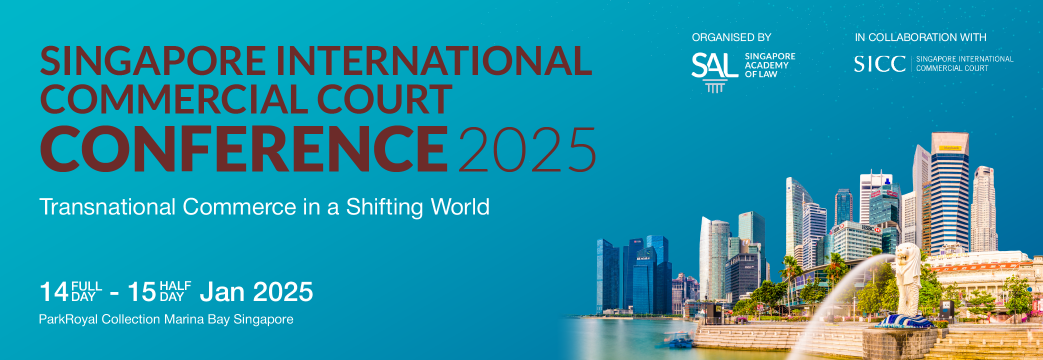SICC CONFERENCE 2025: KEY CHALLENGES IN THE DIGITAL AGE

In the lead-up to the Singapore International Commercial Court Conference 2025, we had the opportunity to chat with Justice Anselmo Reyes, International Judge of the Singapore International Commercial Court, who will be moderating a panel session at the Conference, and Mr. Daniel Chia, Head of Litigation at Herbert Smith Freehills Prolegis, a panellist at the Conference, who provided their insights on the key challenges facing the legal profession in the digital age.
A JUDICIAL PERSPECTIVE
In some jurisdictions, there may be a persistent accumulation of cases. This growing caseload not only impedes access to justice by individuals, but also has far-reaching implications for businesses and economies at large.
AI as a Partner in Justice
Set against this backdrop, Justice Reyes observed that artificial intelligence (AI) has become an essential tool for courts in general and judges. He suggested deploying AI as a solution to streamline case management and even to decide straightforward cases at least at first instance. This could enable better access to justice.
Ensuring Credibility and Fairness in the use of AI
Despite AI’s potential, concerns about its credibility, biases and transparency of AI remain. To address these issues, Justice Reyes highlighted the importance of training AI systems and using diverse datasets that adhere to core legal principles. Ensuring fairness and transparent decision-making processes by AI is critical to fostering trust and mitigating public scepticism.
Blockchain Efficiency across Borders
Traditional methods of document service in arbitration have struggled to keep pace with the exponential rise in global legal disputes. Blockchain technology has emerged as a potential solution.

Blockchain technology, with its tamper-resistant ledger, can enhance international service processes by providing verifiable timestamps and immutable records.
Justice Reyes observed that blockchain technology, with its tamper-resistant, decentralized ledger accessible to all parties, could significantly reduce administrative burdens by enhancing the efficiency of international service processes and evidence-taking across borders, providing verifiable timestamps and immutable records for faster and more reliable transnational notifications.
A PRACTITIONER’S PERSPECTIVE
Mr. Daniel Chia outlined several key challenges legal practices face in navigating digital transformation.
Decentralized Structures and Multi-Jurisdictional Challenges
Digital service delivery will become the single most prevalent type of commercial contract. The decentralised nature of such systems introduces complex and cross-border legal challenges. Creating an adjudicating forum that can navigate multi-jurisdictional and ever evolving laws in real time through the lens of different legal traditions will become more common.
Misinformation
The proliferation of misinformation generated by AI language models poses significant risks to our understanding of forensic, technical and legal knowledge. With AI tools being the go-to source for fast information, there is a need to create and secure databases. In common law jurisdictions, the continued creation of precedents and securing that ever growing databases is crucial to maintaining legal integrity. In this regard, the legal landscape would benefit from more updated and reported judgments in key areas of law which could help foster legal thinking on how to approach the technological changes.
Privacy and Cybersecurity
With heavy reliance on digital infrastructures, data privacy and cybersecurity have become critical concerns. Law firms are not immune and it will increasingly be of utmost importance to have robust cybersecurity and data privacy systems. This will require not just legal but also, technical input. AI automation offers significant costs savings for smaller organisations but the evolving nature of cyber threats will drive up operational costs giving larger organisations with resources an advantage.
Technology in Legal Practice
AI tools have the potential (i) to enhance the efficiency of legal practice; and (ii) serve as "on the job" trainers for younger professionals through "fast information feedback". However, the "black box" nature of AI decision-making raises concerns regarding transparency and reliability – it only knows what it is fed and trained on. There is therefore a critical need to address the opacity of AI systems' decisions – especially since most lawyers are not technologists. Perhaps AI results would need to be "audited" by studying the prompts and data sets. This would slow down output but increase reliability. It may also mean that most routine legal work in the future would be more of an audit function than as a "checker".
Join Us for the Panel Discussion

The upcoming panel discussion at the SICC Conference 2025, TSUNAMI: NEW TECHNOLOGIES features Justice Anselmo Reyes, International Judge, Singapore International Commercial Court as moderator. The session also includes esteemed panellists such as Justice James Allsop, International Judge, Singapore International Commercial Court, Justice Nallini Pathmanathan, Federal Court of Malaysia, Mr Paul Tan, One Essex Court Chambers, Ms Eleanor Hughes, General Counsel, Binance and Mr Daniel Chia, Head of Litigation, Herbert Smith Freehills Prolegis. They will explore issues relating to emerging technologies from a transnational angle bearing in mind the borderless nature of many of these emerging technologies. Their discussion will highlight the innovative strategies the SICC has employed in resolving complex private law issues in tandem with technological advancements.
Registrations for the SICC Conference 2025 are open here.






